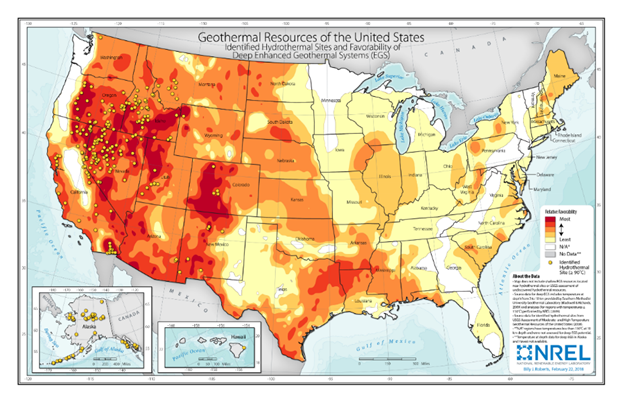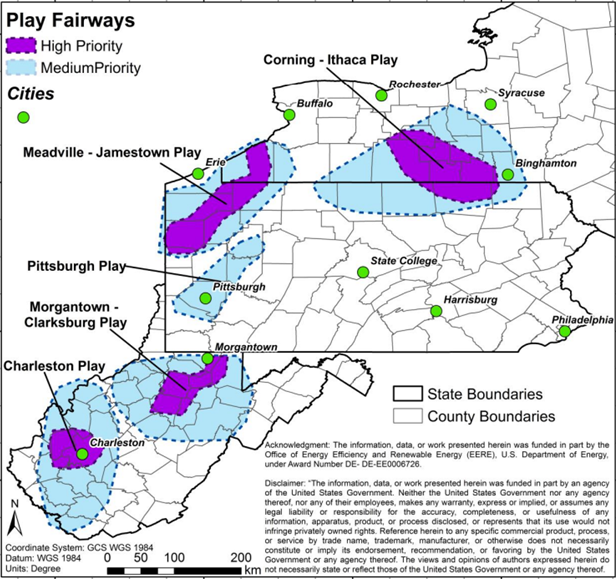
Heat Beneath Our Feet: Pennsylvania’s Prospects for Geothermal Energy
Advances in geothermal energy, propelled by the Biden Administration, have significant potential for decarbonization nationwide, including in Pennsylvania.
Exploiting the nation’s geothermal resources is a hot decarbonization topic.
The United States already generates the most geothermal electricity in the world—enough to power 2.7 million U.S. homes. But a 2023 National Renewable Energy Laboratory (NREL) report found vastly greater potential—enough to meet the needs of 65 million homes.
How do we get there?
By applying the same horizontal drilling technology that unlocked Pennsylvania’s Marcellus formation, coupled with public investment in the development of enhanced geothermal systems (EGS) for electricity generation and other direct uses.
The nation’s EGS potential is largely concentrated in the west. (See Figure 1.)

A 2024 Princeton-led study found that cost declines in drilling technology could lead to over 100 gigawatts of geothermal projects there—more capacity than all U.S. nuclear power plants.
Technology innovations can expand EGS’ potential nationwide, and the Biden Administration is driving their development.
In 2022, the Department of Energy (DOE) launched the Enhanced Geothermal Shot, aiming for a 90% cost reduction of EGS by 2035, and awarded $165 million to expand geothermal energy by “leveraging technologies and workforce from the oil and gas industry.”
As part of that initiative, Project InnerSpace is developing a state-by-state roadmap to growing geothermal energy, along the lines of a landmark 2023 study of Texas.
February 2024 saw significant advances:
- Sage Geosystems obtained funding to construct a 3-MW commercial geothermal energy storage systemin Texas.
- DOE announced $60 million in funding for three projects to demonstrate “the efficacy and scalability” of EGS in California, Utah, and Oregon.
- Houston-based Fervo Energy announced that their drilling technology, which has been supported by the Advanced Research Projects Agency-Energy (ARPA-E), has exceeded DOE’s expectations; and that they’d raised $244 million in new funding.
What about Pennsylvania?
This 1979 report prepared for DOE found that Pennsylvania’s geothermal potential is limited. The state has low-temperature geothermal resources which—importantly—can support building and district heating and cooling, and some industrial processes. As technology advances, Pennsylvania’s resources could support some limited power generation.
A 2016 Cornell University-led study evaluated deep geological reservoirs in the Appalachian Basin portions of New York, Pennsylvania, and West Virginia. It found the most favorable Pennsylvania counties for low-temperature geothermal development were Bradford, Mercer, Crawford, Erie, and Warren, with surrounding medium priority zones. The study also said that the Pittsburgh region merited further inquiry but needs better data. (See Figure 2.)

Pennsylvania obviously has extensive experience with oil and gas development, and has done nation-leading work on using the state’s geological resources for decarbonization. However, the Commonwealth’s policy environment for geothermal energy is weak for at least four reasons:
- Ownership of surface and subsurface rights in Pennsylvania are often severed. Ownership of geothermal resources would likely have to be clarified by statute.
- EGS has some of the same potential risks as unconventional oil and gas development, including groundwater contamination, surface water and ecological impacts at drilling sites, human health impacts, and induced seismicity. The state’s record of developing and enforcing adequate protections against these risks is mixed, and the Department of Environmental Protection is severely understaffed.
- Pennsylvania has no permitting system or regulations governing geothermal energy development, and the process of developing regulations typically takes at least 2-3 years under the best of circumstances.
- The Commonwealth’s 2004 Alternative Energy Portfolio Standards Act defines geothermal energy as a Tier I energy source, but it provides no real incentive for geothermal development. Tier 1 resources must comprise a mere 8% of electricity sales, and cheaper renewables would crowd out electricity generated from geothermal sources. Legislation has been proposed to increase the Tier 1 requirement to 30% by 2030, and the Shapiro Administration supports it.
Stay tuned as the drive toward geothermal energy continues to heat up.
John Quigley
Senior FellowJohn Quigley is a senior fellow at the Kleinman Center and previously served on the Center’s Advisory Board. He served as Secretary of the PA Department of Environmental Protection and of the PA Department of Conservation and Natural Resources.

